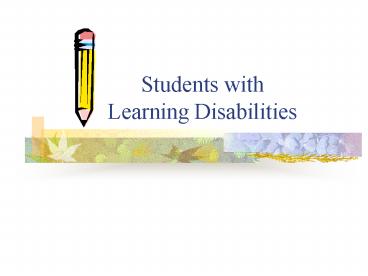Students with Learning Disabilities - PowerPoint PPT Presentation
1 / 16
Title:
Students with Learning Disabilities
Description:
There are no specific reasons as to why learning disabilities ... Provide (discreet) immediate feedback. Breakdown long assignments. Testing should be flexible ... – PowerPoint PPT presentation
Number of Views:290
Avg rating:3.0/5.0
Title: Students with Learning Disabilities
1
Students withLearning Disabilities
2
LD Learning Disabled
- a cognitive disorder that affects people's
ability to either - interpret what they see and hear or
- link information from different parts of the
brain.
3
LD Learning Disabled
- Specific difficulties in
- Reading
- Writing
- Or Arithmetic
4
What causes learning disabilities?
- There are no specific reasons as to why learning
disabilities are found in some people and not in
others. - learning disabilities tend to run in families, so
they can be inherited - are more common in boys than in girls
5
What this means to us as teachers. . . .
- Over 50 of student disabilities are learning
disabilities. (2000) - At least 10 of the population has one or more
learning disabilities. - 5 of students receive special education services
6
What this means to us as teachers. . . .
- One of the major educational implications for a
child with a learning disability depends on when
the disability is diagnosed. - As teachers, we need to be able to recognize
characteristics in order to effectively teach our
students with learning disabilities.
7
Common Characteristics
- Discrepancy between intelligence and performance
- Fluctuations in day to day performance
- unpredictable test performance
- incomplete work
- Language problems show up as delays or
difficulties in - listening, speaking, reading, writing and
spelling
8
Common Characteristics
- Math problems consist of difficulties with
- understanding concepts
- problem solving
- Organizing thoughts
- difficulties with information and instructions
- disorganized approach to learning
9
Referral Process
- Educational professionals have the task of
distinguishing between students with learning
disabilities and students who may be low
achievers.
10
Pre-referral
- Once a pattern is recognized
- Check your students records
- Get feedback from other teachers and guidance
counselors - Hold a parent conference
- Start with the positive
- Get the parents feedback
- Explain the problems
- .He is having difficulty with
- .I would like to try giving him some extra
attention
11
Referral
- If everyone agrees, refer the student for
evaluation - (must have written notification from the family)
- A Child Study Team will be formed
- Assessment or testing by the School Psychologist
- Identification of the disability
- Recommendation by the Psychologist
- Approval by the Child Study Team
- Instructional Recommendations (IEP)
12
Individualized Education Program (IEP)
- A program tailored to the needs of a learner with
exceptionalities. - The individualized education program consists of
the childs - level of academic performance
- long term goals
- short term goals
- all services that the child will be receiving
13
- Annual review
- Termination
- Renewal
- or additions to the IEP
14
Strategies in the classroom
- Allowing time will reduce frustration
- (time to respond, test, complete activities)
- Set priorities
- focus on the task at hand
- Take into account the students Learning Style
- Make sure learning materials are available
15
Strategies in the classroom
- Provide (discreet) immediate feedback
- Breakdown long assignments
- Testing should be flexible
- (this maybe listed on the IEP)
- Maintain constant communication
- (parents, resource teacher, tutors)
16
References
- Giuliani, George (2001). What Every Teacher
Should Know about Students with Special Needs.
Champaign, Il Research Press. - Slavin, Robert (2003). Educational Psychology
Theory and Practice, Seventh Edition. Boston,
MA Allyn and Bacon. - National Center for Learning Disabilities
www.ncld.org































